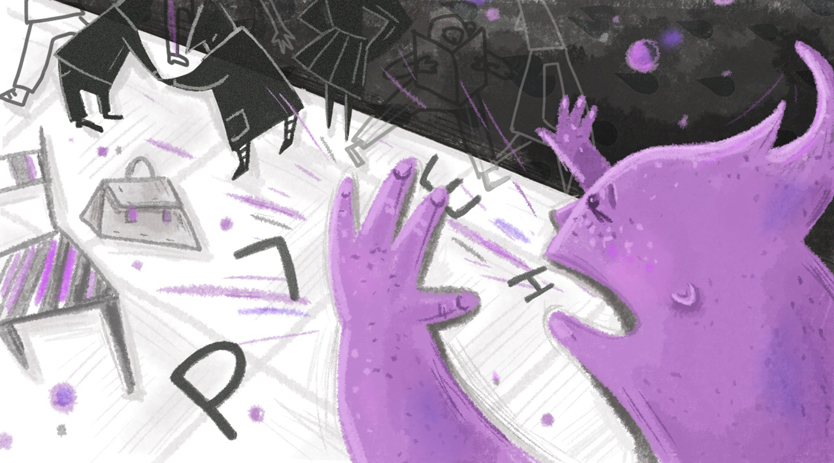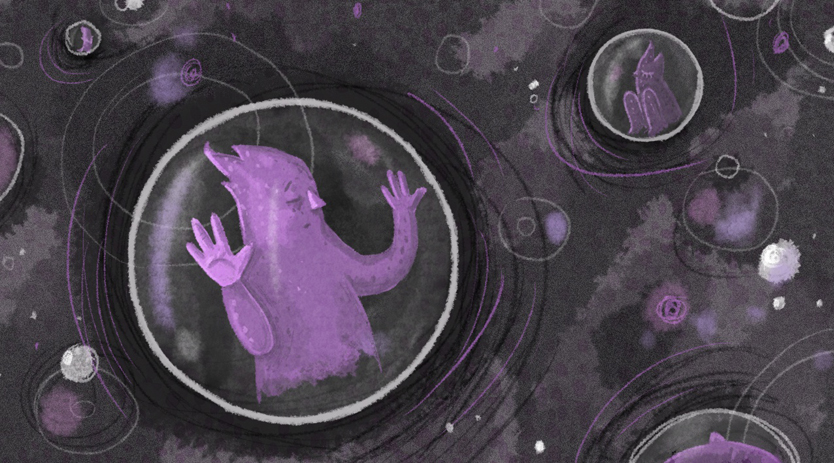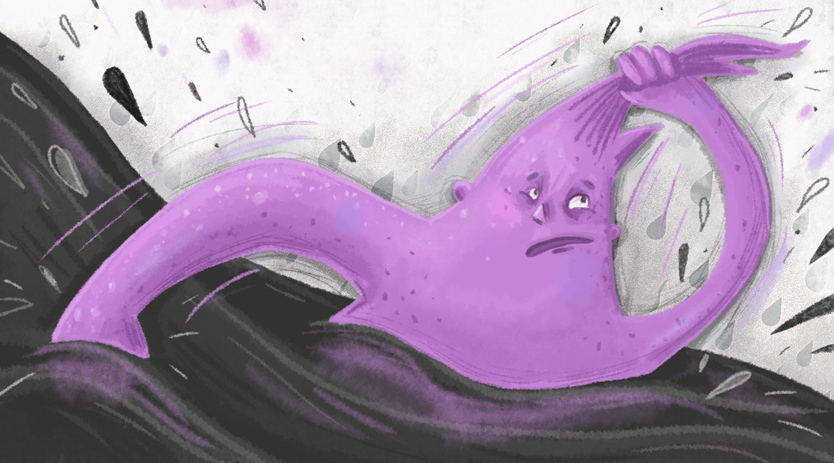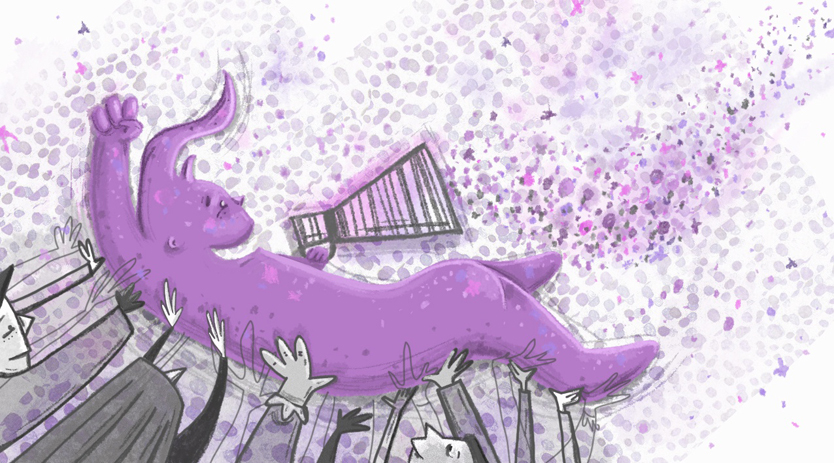Yes, I am an LGBT activist. No, I'm not a human rights activist
Why it's dangerous to recognize any project that speaks of the experience of the discriminated group as a human rights project "by default".

LGBT activist Milana Levitskaya wrote this text for the Belarusian feminist anti-discrimination project about gender and sexuality MAKEOUT. We publish the translation of the article.

By this text I mean to say why it seems to me dangerous and inefficient to recognize any project that speaks of the experience of the discriminated group as a human rights project "by default".
I have been engaged in LGBT activism for several years. And during all this time I face the opinion that any project that speaks about the inadmissibility of discrimination is human rights advocacy. In a broad sense, this is indeed so, because human rights are protected not only by legal instruments. And in the narrow?
It’s sink or swim
I believe that human rights can be understood in different ways. It can be understood as a worldview or a mission but also as real service help. The difference can be indistinguishable if we are talking about positive systemic changes in society. But it is really marked differently when we take a side of the victims. Human rights organizations that provide legal assistance have clients. These are citizens whose rights have been violated as a result of the unfair operation of the social system. Educational, cultural or information projects working with vulnerable groups do not and cannot have targeted clients as they work with the public opinion.
The person, who has been fired, deported or beaten today, cannot wait for the society to “get enlightened”, “be ready” or “change”. They need right now to face the legal system, the courts, the clerical language of all kinds of petitions, statements and other things, which they, most likely, do not understand at all. We are not born with the knowledge of our rights. At schools, we are taught to sew aprons, make stools, distinguish the trochee from iambic, but we are not told what to do if they come to you with a search and deny the right to make a phone call. It is logical that all citizens expect that in case of violation of their rights there will be people who deliberately and voluntarily devote their time, profession or life in general to such questions.
In case with projects created by representatives of vulnerable groups in order to talk about their problems, the Schrödinger paradox happens. LGBT+ people, people living with HIV or tuberculosis, elderly people, parents of children with rare genetic diseases or developmental delay, people with disabilities, people who survived domestic violence and many other social groups... These people create projects about their experiences on their own, because often society has not provided anything for them, because “this is a private problem”. In a society where a quantitative majority determines the importance of the topic, people like me have no other chance to be properly informed about their lives except to find and publish it on their own. That is why such projects, even being informational or artistic, will always talk about discrimination and exclusion.
On the one hand, to identify problems of social inequality is, of course, a human rights perspective. And on the other hand, representatives of a vulnerable group themselves are most likely victims of discrimination. And they are not at all obliged to have the skill of defending their rights. And most often they do not have it. But they certainly have enough situations when all possible ways to “regain their rights” haven’t worked.
Projects “for and on behalf of a vulnerable group” are often formed amid pain and anger, namely, because of the inability to protect their rights and borders. However, in case of human rights, it turns out that the perspective on the topic of human rights puts you in a strange position – just like Munchausen you should drag yourselves by the hair from a swamp.

“No one owes anything to anyone”
It is important to point out that we are not talking about the fact that positive changes for any social group should be “given on a platter”. Apart from the fact that in “my ideal world” basic rights belong to everyone from their birth and are not disputed in the process of life. The struggle for “my rights” is not only “my business” because the social changes that we are all talking about are not “changes for me”. These are changes that will contribute to security and justice for every person. It is at least strange to suppose that the rescue of a drowning man is the drowning man's own job, if we assume that social inequality and discrimination exist, which means that our resources for defending ourselves are not equal. And without this understanding, any protection slips into the idea of “how you will present yourself”.
A person who has suffered from violence cannot “help themselves”. Yes, the main decision, the decision to seek a way out of the situation of violence, belongs to him or her. But such a decision can only be made based on the help and support of people who have more resources at the moment. A transgender person, who was insulted and “glorified” in the press, cannot “defend themselves”. If they could do this, the victim's persecution would not continue accompanied by the hiss of the crowd. They needs a reminder that in this country they have the same right to protection of private life as any cisgender person, as well as a detailed action plan for filing complaints and an agreement with a lawyer that will help to cope with the fear and start a march through the authorities, despite PTSD and dysphoria. A homosexual man, who is insulted and harassed by police when trying to seek help, cannot in such a situation “protect himself”. He needs help in explaining his rights and drafting documents if he wants to appeal an unfair and biased attitude to a higher authority.
Often all these people need help even in order to understand at all that what happened is not the norm. And most importantly, they need a broad solidarity, and not only work “strictly on demand”. If for years you live in a situation when you are constantly told about your “second-class citizen”, then a specific request for help can be formed only after several years of psychotherapy.

“Speciality” or solidarity?
I am a lesbian and a LGBT activist. I am part of a vulnerable group and I talk about the problems that I encounter in my experience. And I know for sure that I cannot protect myself in case of systemic discrimination. This is what motivates me to write educational texts, create educational activities, participate in support groups and do my best to make people with similar experience know that they are not alone and that their feelings of injustice and despair are recognized by somebody. In a situation of violence or discrimination the system makes the victim silent and accepting the situation as the norm. And the presence of voices from within a vulnerable group gives a person who has fallen into a difficult life situation a breath of reality in a total horror of what is happening. “I exist, my body exists, my family exists, I am a person, it cannot be done to me” – I have to remember all these things, and sometimes it takes a lot of effort.
I remain a vulnerable person even if I am privileged enough (I’m open, I have support from family and colleagues, friends who have become an excellent team, an ability to speak first-person). This means that because of my identity and openness I am constantly at risk of gender-based violence. Every new acquaintance for me requires a coming out; the change of work or housing is connected with the next possibility of discriminatory refusal, activism – with the possibility of homophobic aggression on the part of the structures which I try to interact with. I emphasize for those who still do not see the difference between prejudice towards the individual or the social group: discrimination is not the fact that they deny me, but the fact that the basis for refusal is sexual orientation, which should not concern an employer, a landlord, a seller or a border guard at all.
And while I am part of an vulnerable group I need confidence in the readiness of human rights organizations to work with my cases and not the belief that the human rights organization itself will advise someone else to protect my rights because the victim of discrimination is “also a lesbian”. I really respect the work of all who give their forces to civil activism. But I am also convinced that for vulnerable social groups there should be not only “special profile organizations”. It's like an old joke, which plays out the discriminating view of the privileged person on things: “Are you a lesbian? Cool, in my city there also lives a lesbian. You probably know each other”. Aha, and in this city there are many heterosexual people. All of them probably know each other as well.

What is common between slavery in the US and homophobia in Belarus?
In the days of slavery in the United States in the southern states, black people created a mutual aid system called The Underground Railroad. This was a chain of abolitionists (supporters of anti-slavery movement) who helped runaway slaves from plantations to safely reach northern states where slavery had already been abolished. An important detail of this system was the alliance of slaves and abolitionists. Because in a system in which there is a strong social inequality right now, a privileged person has far fewer risks helping to carry out human rights activities than the bearer of stigma, and most importantly, they have much more opportunities to help. Yes, in a situation of violation of the rights of a vulnerable group, it is important that assistance is provided upon request. But it’s just as important that it happens at all.
Very often, when it comes to alliance and support, I hear that the more privileged person in this matter is “afraid to meddle in affairs” and lead someone else’s demonstration (and indeed there are many such historical examples). But the call for an alliance is not an offer to take a “foreign flag” into your own hands. It is a request to use your resources to help if your risks are less critical.
Statements like “you just say and we’ll support you” are very important. They allow you not to take a voice from a vulnerable group and do not occupy someone else’s space. However, they only work in a system where the voice of a quantitative minority can be heard by the system and not simply ignored. If for any statement of a vulnerable group the system disputes the very fact of the existence of this group, such a support offer is useless, as are the wheelchair ramps established in Minsk leading to narrow doors and stairs.
As an LGBT activist I constantly face feedback from human rights organizations that they are ready to support our protection of our rights. And compared to the years when homophobia and sexism were common in the human rights community this is great news. Perhaps this text is the beginning of a conversation about how to hear the request and give support. And one day LGBT people will feel support not at the moment when human rights activists will offer to make a statement of discrimination “less emotional”. And not even when they sign a manifesto written by LGBT people. It is the moment when being frustrated and desperate after another failure of the event or insult in the press I will receive a press release on the LGBT project mail that human rights organizations consider what is happening to be abnormal and made their statement. Dreaming is not harmful?